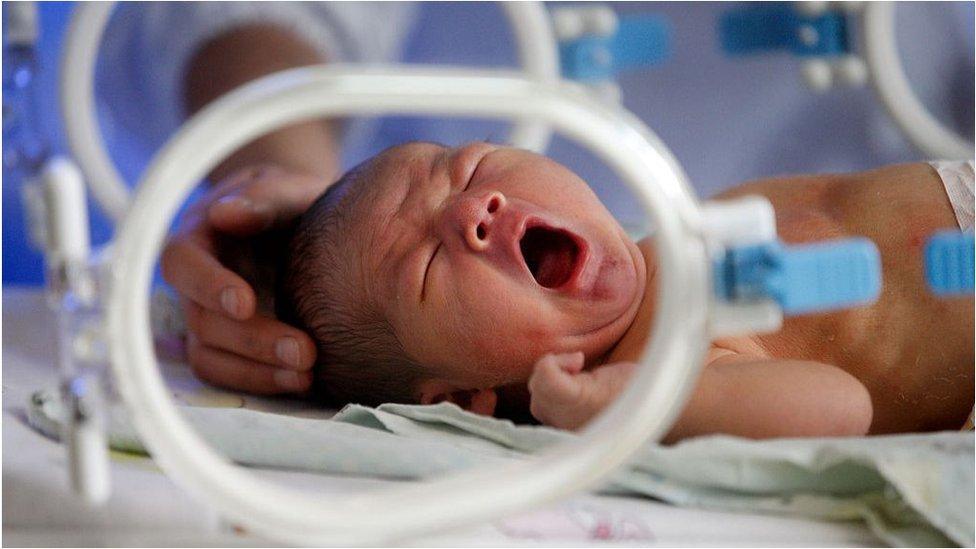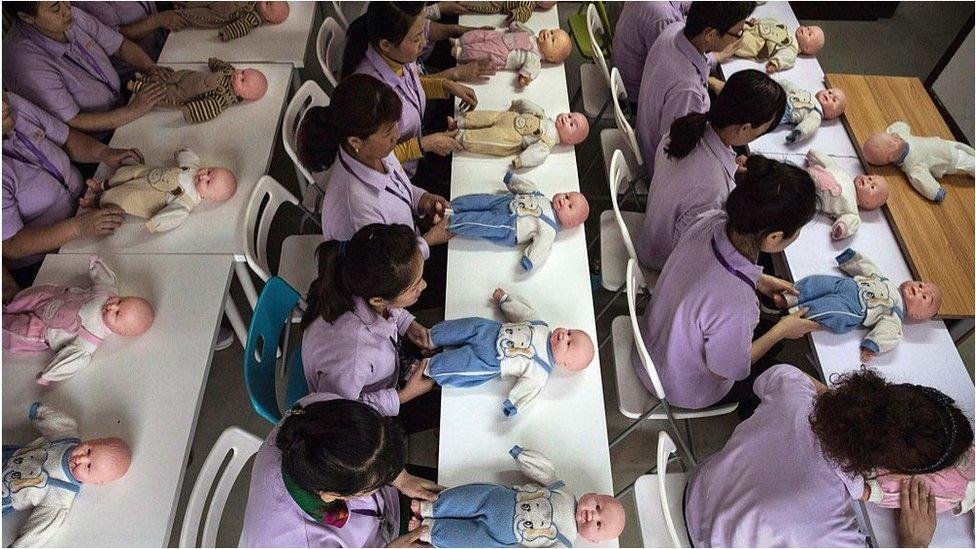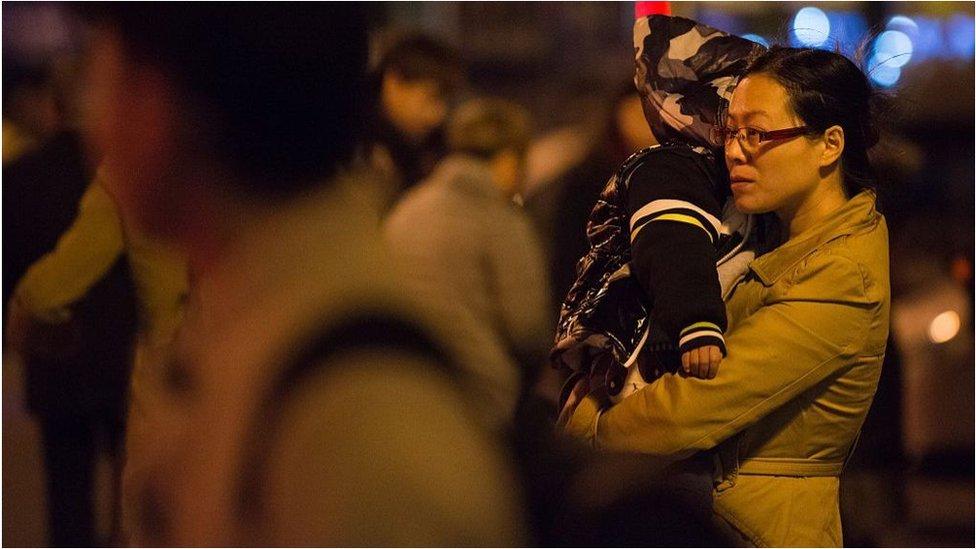
“I no fit afford kids,” Gloria tok. Na married woman wey dey for her 30s.
She don calculate say e go cost around $2,400 per month on top of her oda expenses to raise one pikin where she live for China.
“E go 3,000 yuan ($436) for daily expenses such as food. 2,000 ($291) for kindergarten, 1,000 ($145) for part-time childcare if di parents need am and at least 10,000 ($1,456) for schooling.”
Gloria work part-time as primary school teacher for Guangdong province for southern China.
Di average income for dose wey dey work for private sector for dis part of di kontri na about 6,000 yuan per month ($873).
As di only pikin for her family, sake of China one-child policy, she tok say she need to focus on paying her mortgage and saving money for her old parents.
Shrinking population
China dey experience demographic shift: dia population dey reduce for di first time in six decades.
And new data show most Chinese women want only one pikin or dem no want at all.
Di percentage of Chinese women wey remain childless rise from 6% in 2015 to 10% in 2020, according to one recent survey by di China Population and Development Research Centre.
E also show Chinese women wey dey childbearing age get lower fertility intentions, wit di average desired number of pikin dropping to 1.64 for 2021 compared to 1.76 for 2017.
While oda Asian kontris like Singapore, Japan, and South Korea also get fertility rate below two, most pipo tok say dem still get desire for two pikin dem. For China, dat no be di case.
While oda Asian countries like Singapore, Japan, and South Korea also get fertility rate below two, most pipo say dem still desire two children. For China dat no be di case.
“In dis sense, China dey different from odas, becos no be only say di actual fertility low, but fertility desire also dey low,” Dr Shuang Chen tok. Na assistant professor for International Social and Public Policy for di London School of Economics and Political Science.
As China kick off dia “two sessions” political meetings – di most important of di year – on 4 March, political advisers don submit various proposals on boosting di birth rate. Suggestions include supporting unmarried women to freeze eggs and waiving tuition and textbook fees from kindergarten to college.
Anoda idea na to grant pikin wey dem born to unmarried parents equal rights. For China, pikin wey dem born to unmarried parents get difficulties in obtaining “hukou”, wey be di official household registration required for education, health care and social welfare, and di administration fees fit dey costly.
Living in di ‘rat race’

Di high cost of raising pikin na one of di main reasons Chinese women no wan give birth.
For China, competition wit your peers start almost di minute wey dem born you – wit parents trying to get you into beta school by buying houses near popular school districts and enrolling dia pikin into various extracurricular classes.
“I no want bring new life into such a cutthroat competitive environment,” 22-year-old college student Mia tok.
Mia wey dem born for small town for northern China, find her education centred around exams. She take China high-stakes national college entrance exam, popularly known as di Gaokao, and from dia she enta one ogbonge university for Beijing.
But she tok say she feel stressed out most of di time.
She tok say graduates today gazz also compete wit dose wey don get means to study abroad.
“All dis extra educational support need moni,” Mia tok. She no tink say she fit earn enough moni to give any future pikin such opportunities.
“If I no fit provide for pikin to thrive in dis way, den why I go bring a life into dis world?”
Work-life balance

Di women BBC Chinese interview also mention say negative impacts on dia careers na factor wey make dem decide say dem no go get pikin.
Di women say dem dey ask dem for job interviews if dem plan to get pikin in di next few years. Dem say if dem reply yes, den dia chances of getting di job dey lower, or dem go get less chance of getting promotion.
“Di balance of life and work na factor wey many Chinese women for higher education dey emphasise wen dem dey consider weda dem ready for baby,” Dr Yun Zhou tell BBC. Na assistant professor for sociology at di University of Michigan.
“Work for dem dey all about self-realisation,” she tok. “For job market wey dey full of gender discrimination, e dey hard to choose between career and having pikin.”
‘I experience online bullying after I tok say I no wan give birth’
Like many young adults wey love to share dia lives on social media, Mia record one video explaining why she wan remain childless and post am on di internet.
To her surprise, she receive hundreds of abusive comments.
Many accuse am say she dey selfish. Some say she no sabi her own mind as she still dey for her early 20s.
“You no get wetin e take to say dat. See if you still tink dat wen you dey in your 40s,” one user comment.
“I bet $10,000 you’ll regret it,” anoda pesin tok.
Some don even go far to call am “a foreign force” wey dey “incite” pipo not to born pikin.
Di Chinese goment introduce dia three-child policy for May 2021 in response to di 2020 census results, which show Chinese mothers give birth to just 12 million babies dat year, di lowest number of births since 1961.
Di goment in recent years don introduce many new policies to encourage more pipo to get pikin.
But sake of China low fertility rates, some pipo believe say woman wey say no to childbirth dey let di kontri down.
“Na my personal choice. I no dey advocate di idea of no births. I respect di pipo wey want pikin dem,” Mia tok.
‘I fight hard battle’
To challenge family expectations around having pikin fit dey hard.
“I fight hard battle,” 34-year-old Yuan Xueping tok. Born and raised for one rural area where giving birth to male pikin to carry on di family name dey regarded as woman duty, she struggle to say no to childbirth.
Ms Yuan and her elder sister no fit go college, though she dey among di top three students for her high school. Her parents only pay for her younger brother to get further education.
“My parents always say: ‘Wetin be di point of girl going to college? Sooner or later, you go get married and stay home to raise your pikin dem,'” Ms Yuan tok.
Wen her aunt, of a similar age, divorce and begin to raise two pikin alone, she dey even more discouraged.
“I no trust in di institution of marriage anymore,” she tok, afta leaving home for one city where she enjoy her independence.
“I read and hang out wit friends in my spare time. I feel free.”
Additional reporting by Lara Owen










